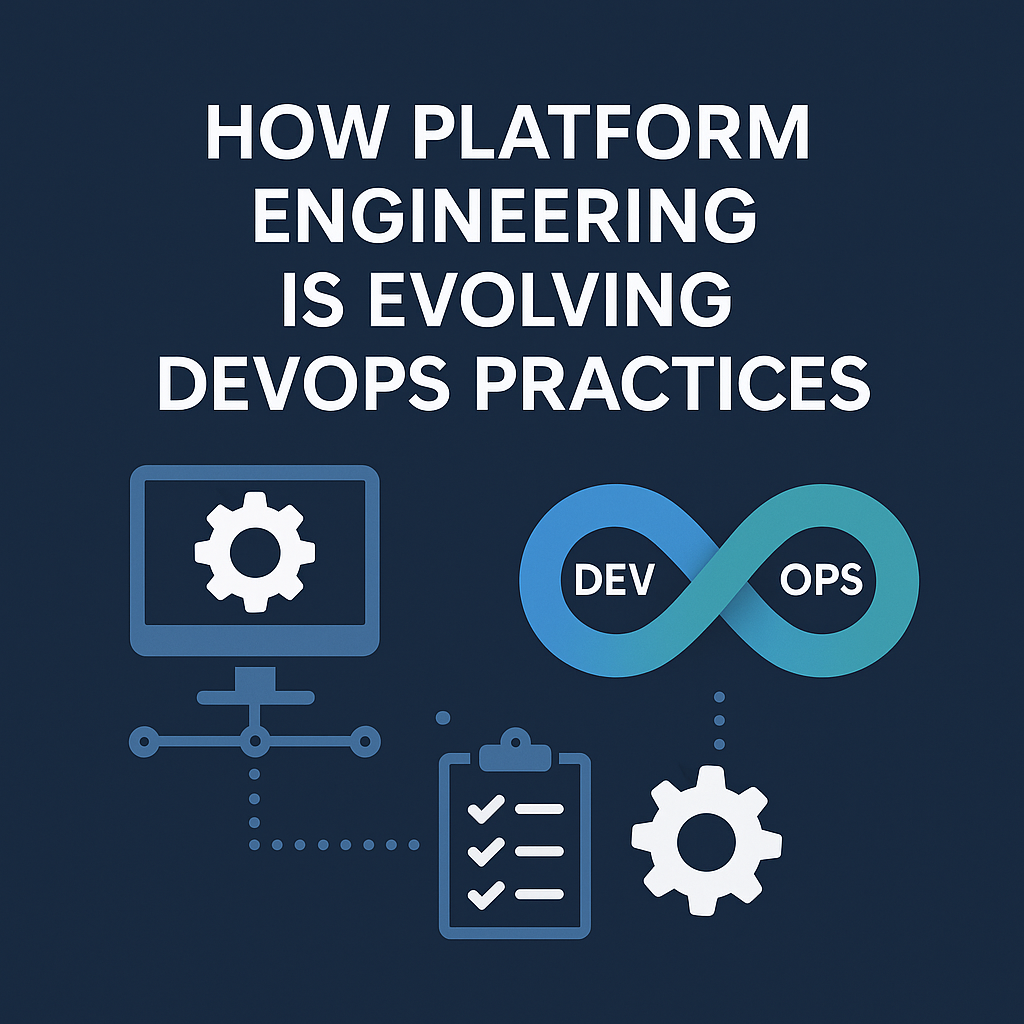How Platform Engineering is Evolving DevOps Practices

In recent years, the landscape of software delivery has been transformed by the rapid evolution of tools, processes, and organizational structures. While DevOps has played a pivotal role in streamlining collaboration between development and operations teams, a new discipline—Platform Engineering—has emerged to push these innovations even further.
Platform engineering is not a replacement for DevOps, but a natural evolution. It builds on DevOps principles while addressing the complexity and scalability challenges that modern organizations face as they adopt microservices, cloud-native architectures, and self-service tooling. In this post, we’ll explore what platform engineering is, why it’s gaining traction, and how it is evolving the way DevOps practices are implemented.
What is Platform Engineering?
Platform engineering is the practice of designing, building, and maintaining internal developer platforms (IDPs) that standardize infrastructure and tooling for software delivery. These platforms are tailored to the needs of development teams, offering reusable components and workflows that abstract away operational complexity.
At its core, platform engineering is about enabling developer self-service without compromising security, compliance, or reliability. By productizing infrastructure and operational capabilities, platform engineers create a "golden path" for developers that simplifies the process of deploying, monitoring, and managing applications.
The DevOps Challenge: Scaling in Complex Environments
While DevOps revolutionized software delivery by breaking down silos between dev and ops, it often came with hidden costs:
Tooling sprawl: Teams adopted different CI/CD tools, observability stacks, and infrastructure automation scripts.
Cognitive load: Developers had to understand networking, Kubernetes, cloud configurations, and more—often outside their core competencies.
Inconsistency: Without standardization, every team solved similar problems differently, leading to duplicated efforts and misalignment.
As organizations grew, so did these challenges. This is where platform engineering steps in.
How Platform Engineering Is Evolving DevOps
1. From Custom Scripts to Internal Developer Platforms
Instead of every team writing its own Terraform modules or Kubernetes manifests, platform engineers build centralized platforms with APIs, UIs, and templates. These platforms manage infrastructure provisioning, secrets, CI/CD pipelines, and monitoring in a unified way.
This reduces duplication, improves security, and allows platform teams to treat infrastructure as a product.
2. Product Thinking for Internal Tools
Platform engineers take a product management approach to internal tooling. They engage with developers as customers, gather feedback, iterate on features, and measure adoption. This shift ensures that tools are not just technically sound but also user-friendly and valuable to end-users.
This also fosters a cultural change where platform teams are accountable for the developer experience, not just uptime or system performance.
3. Empowering Developers Through Self-Service
A key tenet of platform engineering is developer self-service. Developers no longer need to open tickets for infrastructure or deployment changes. Instead, they can:
Spin up environments with a click
Deploy code using opinionated pipelines
Access logs, metrics, and alerts without asking ops
This significantly reduces bottlenecks and improves lead time, a key DevOps metric.
4. Improving DevOps Metrics at Scale
Platform engineering strengthens core DevOps goals, particularly:
Lead Time: Self-service environments and automated pipelines reduce time from code to production.
Change Failure Rate: Standardized patterns reduce errors and misconfigurations.
Deployment Frequency: Safe, repeatable workflows encourage faster, more frequent releases.
MTTR (Mean Time to Recovery): Unified observability tools and pre-configured dashboards speed up troubleshooting.
In short, platform engineering makes DevOps metrics more achievable at scale.
5. Shifting from “You Build It, You Run It” to “We Build the Platform, You Use It”
DevOps popularized the idea that developers should own the full lifecycle of their code. But in large organizations, this model breaks down due to complexity and specialization. Platform engineering introduces a middle ground:
Developers own application logic and business outcomes.
Platform teams own the platform, infrastructure abstractions, and golden paths.
This separation of concerns leads to greater efficiency and higher-quality operations.
Real-World Examples
Spotify’s Backstage
Spotify built Backstage, an internal developer portal that now powers its engineering platform. It provides templates, documentation, service catalogs, and plugins—all aimed at improving the developer experience.
Backstage is now open source and widely adopted by other organizations as a core platform engineering tool.
Airbnb’s Developer Platform
Airbnb’s platform team built internal tools that allowed developers to self-service deployments, monitor services, and manage infrastructure without needing to understand Kubernetes internals. This drastically improved velocity and reduced incidents caused by misconfigurations.
Tooling in the Platform Engineering Ecosystem
Some tools and frameworks widely used by platform engineering teams include:
Backstage: Developer portals and service catalogs
Terraform / Pulumi: Infrastructure as Code
Crossplane: Kubernetes-native infrastructure control
ArgoCD / Flux: GitOps-based continuous delivery
Kubernetes Operators: Automating platform services
OPA / Kyverno: Policy enforcement
Grafana / Prometheus / Loki: Unified observability stack
Conclusion
Platform engineering is not about abandoning DevOps—it’s about operationalizing DevOps principles at scale, with a focus on developer experience and platform standardization. By treating infrastructure and tools as products, platform engineering allows organizations to reduce cognitive load, improve velocity, and enforce consistency across teams.
As organizations grow more complex, platform engineering is becoming an essential layer between raw infrastructure and application development. It’s the next step in the evolution of DevOps—one that promises to make high-performance software delivery the default, not the exception.
Final Thoughts
If you’re a DevOps engineer, SRE, or software architect, now is the time to explore platform engineering. Whether by contributing to an internal platform team or helping define golden paths for your org, you can be at the forefront of this evolution.
DevOps brought speed. Platform engineering brings scalability. Together, they power the future of software delivery.